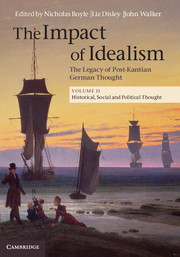Book contents
- Frontmatter
- Contents
- List of Contributors
- Acknowledgements
- List of Abbreviations
- Introduction: Idealism in historical, social and political thought
- 1 From transcendental idealism to political realism
- 2 The public of the intellectuals – from Kant to Lyotard
- 3 Idealism and the idea of a constitution
- 4 German Idealism and Marx
- 5 Ethos, nature and education in Johann Erich von Berger and Friedrich Adolf Trendelenburg
- 6 The concept and philosophy of culture in Neo-Kantianism
- 7 After materialism – reflections of Idealism in Lebensphilosophie: Dilthey, Bergson and Simmel
- 8 ‘Rationalisation’, ‘reification’, ‘instrumental reason’
- 9 Freedom within nature: Adorno on the idea of reason's autonomy
- 10 German neo-Hegelianism and a plea for another Hegel
- 11 Idealism and the fascist corporative state
- 12 Love and recognition in Fichte and the alternative position of de Beauvoir
- 13 Hegel's concept of recognition and its reception in the humanist feminism of Simone de Beauvoir
- 14 Giving an account of oneself amongst others: Hegel, Judith Butler and social ontology
- 15 Idealism in the German tradition of meta-history
- Bibliography
- Index
- References
15 - Idealism in the German tradition of meta-history
Published online by Cambridge University Press: 05 December 2013
- Frontmatter
- Contents
- List of Contributors
- Acknowledgements
- List of Abbreviations
- Introduction: Idealism in historical, social and political thought
- 1 From transcendental idealism to political realism
- 2 The public of the intellectuals – from Kant to Lyotard
- 3 Idealism and the idea of a constitution
- 4 German Idealism and Marx
- 5 Ethos, nature and education in Johann Erich von Berger and Friedrich Adolf Trendelenburg
- 6 The concept and philosophy of culture in Neo-Kantianism
- 7 After materialism – reflections of Idealism in Lebensphilosophie: Dilthey, Bergson and Simmel
- 8 ‘Rationalisation’, ‘reification’, ‘instrumental reason’
- 9 Freedom within nature: Adorno on the idea of reason's autonomy
- 10 German neo-Hegelianism and a plea for another Hegel
- 11 Idealism and the fascist corporative state
- 12 Love and recognition in Fichte and the alternative position of de Beauvoir
- 13 Hegel's concept of recognition and its reception in the humanist feminism of Simone de Beauvoir
- 14 Giving an account of oneself amongst others: Hegel, Judith Butler and social ontology
- 15 Idealism in the German tradition of meta-history
- Bibliography
- Index
- References
Summary
This chapter will consider the impact of the Idealist tradition on a key element in the development of both the philosophy of history and the historical profession in Germany: the idea of meta-history. By meta-history is meant a more or less systematic reflection on the principles and procedures of historical thinking, mainly in its academic professional form. In most languages other than English this form of reflection is described as ‘scientific’. In the German discourse on this reflection, the term Historik is used.
The development of the German tradition of meta-history goes along with the formation of the professional or scientific character of historical scholarship in Germany. This process of professionalisation started in Germany at the end of the eighteenth century and ended with the institutionalisation of historical studies as an academic discipline in the first half of the nineteenth century. This transformation took place in many different forms and places like specialist journals with a discourse on historical research, and academic teaching in historical seminars, where the students were taught how to examine historical sources in a professional way. In terms of scholarship the scientific character of historical studies became manifest in extensive editions of historical sources like the Monumenta Germaniae Historica (founded 1819) or the Corpus Inscriptionum Graecarum (founded 1815).
- Type
- Chapter
- Information
- The Impact of IdealismThe Legacy of Post-Kantian German Thought, pp. 331 - 343Publisher: Cambridge University PressPrint publication year: 2013



